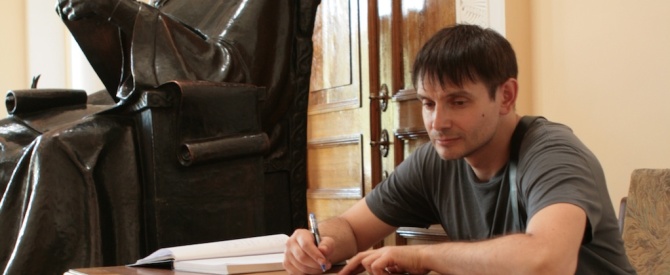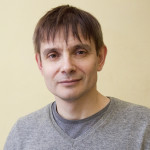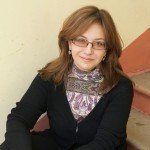Interview with the head of Step Up’s Literature Club

In the many years our Centre has existed, there have been countless amazing events and changes not only in the Centre’s life, but also in the lives of specific people – students or teachers. Wonderful people work at Step Up. It is thanks to our teachers that the students who come here gain hope and life goals.
We want to share an interview with a remarkable person, teacher and head of Literature Club. Mikhail Sverdlov tells us what Step Up means for him and about the Literature Club, which is a longstanding part of the Centre and a place where students, teachers and guests meet to talk about novels and poetry…
Mikhail, when and how did you start working at Step Up?
My friend, Lena Stafeva, who I think worked at the Centre for no more than two years, maybe not even a year, brought me here. Perhaps unsurprisingly the history of ROOF and Step Up owes a lot to Olga Tikhomirova. That was in 1999, I think. Can you imagine? 13 years ago. I’ve worked in the organisation since the first year of its existence.
The history of Step Up goes back for more than ten years and we have had our ups and downs. How would you describe the Centre’s current situation, considering your long experience of working here?
I would call this period a period of common sense and rational warm-heartedness, because warmth can go too far and tip into sentimentality. I like what’s happening now. Looking at history from the position of my many years, like Pimen the Chronicler, I like what’s happening. There is balance. I like the teaching team, I like the atmosphere, I like the fact that there is no disorganisation, but that, nevertheless, various events like trips and celebrating birthdays happen. There is a natural feel to the surroundings, there is a clearly intelligible policy behind our work and a very good relationship with the students, which they feel – you can’t fool them.
What has kept you here for all this time? There must have been hard moments.
For me there is something of a family feeling: I’m drawn here, let’s put it that way. Attraction and empathy, friendliness – that’s the understanding that links me both to the teachers and the students. Also, I have always taken them as my own, and they took me as one of their own too – you make friends. It’s a place where you feel at home. It’s very difficult to leave such a place, even if such thoughts do appear from time to time.
The Literature Club, still running today thanks to you, has an important place in the life of the Centre. Can you tell us where the idea of having such a club came from?
The idea came up a very long time ago. The Club is more than eleven years old. I think that it started in the second year I was here thanks to Irina Pavlovna. I totally didn’t have faith in her idea and was rather sceptical. Why chose such serious artistic literature, a difficult subject for our students? At times there were only three adults at gatherings, and no students at all. There were only a few students who came in the beginning – teachers who were interested came, one-off visitors did, and the Club carried on existing. This all means that the Club has known different, very unusual, people. This has given the Club its charm.
Then Olga Tikhomirova began a policy of involving our students, and this is the latest, most modern, period in its existence. It is now rare for the Club to be without a quorum and both orphanage residents and graduates participate. For them it is a kind of mark in Step Up’s calendar, they attend and they are curious about it. All in all, the Club has become part of Step Up, an integral part of the organisation. This is very important.
What do you think the Literature Club gives those who attend?
That’s a difficult question. In general I’m shy about speaking about literature and I am not convinced that everyone needs it. It’s needed only by a certain elite – not by everyone. But, that said, literature is absolutely necessary for the development of an individual identity. Without literature, individual development is incomplete. But not everyone needs to develop their identity, not everyone is capable of developing it, not everyone wants to – and I cannot force people. I’ll answer the question, if you want, but if you don’t want, I’m prepared to be silent – that’s my approach. People need to speak about what seems to be relevant to them personally, about something which is higher, something that relates to the vital, the day-to-day.
We need to talk about culture otherwise our lives are poorer. If we manage to strike up such a cultural conversation, which is not easy, then it’s a success for everyone. It’s a stroke of luck for those who speak, those who listen, and those who participate – for the leaders and for those just listening. If we don’t manage to, then it’s just reality – not everyone can take part in such discussions.
Culture’s like that. It doesn’t come to everyone, isn’t needed by everyone, not everyone has the faculties to appreciate it. But you need to give people the chance to speak about it, because most institutions either do not offer that chance at all, or offer some sort of profanity. Moreover, our students are always respectful and listen at the Club – it’s a space where you can speak and people will hear you out. People will argue with you, agree with you, but not put you in the dock and ask you questions as though it were some sort of exam.
What is literature? Literature is entering the world, the real world, the unlimited sphere of the everyday. If you have the chance to do this, then you should use it – it’s that simple. A friendly conversation over a cup of tea and not a lesson – there aren’t many such clubs in Moscow.
Do you have a story about a Step Up student that particularly sticks in your mind?
I’ll just say one thing. I have frequently been pleasantly surprised by what happens to people. You see people in a beginning phase, and suddenly, gradually, over the next year, three years down the line, some kind of change takes place in them. At Step Up, people work and talk with the students – they don’t reject them. They argue with them, shout at them, but in an affectionate way. Several times changes that I didn’t expect took place right before my eyes. I was always sceptical. I am a stern old soldier who doesn’t know the word love, but I have been touched several times when witnessing the changes that have taken place – really affected. It was astonishing and you can talk about it, or be silent. Very recently, in my last lesson, I was mistaken in my evaluation of a situation with a student. I was irritated and said something and was so wrong. But I’ve recognised my mistake and in the future, I say it now, I will never again rush to conclusions when our students are involved. I won’t jump to conclusions. You need to wait and see, because miracles do happen…









